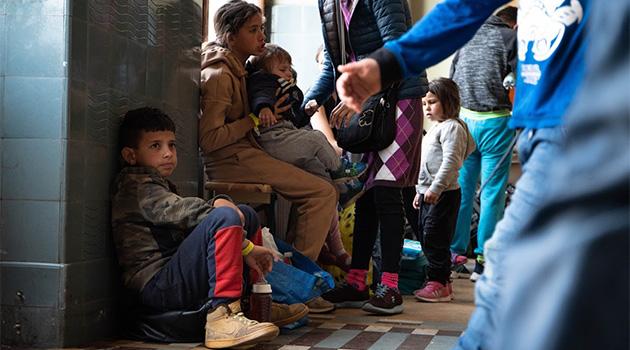Romani Ukrainians sought a better life in the Czech Republic, but discrimination and hostile conditions deterred them. Just a few hundred remain today

Exactly one year ago, President Vladimir Putin of the Russian Federation launched the full-fledged invasion of Ukraine, forcing many Romani people from there to seek shelter abroad, including in the Czech Republic. Roughly 300 Romani Ukrainians, according to nonprofit organizations, decided to settle in the Czech Republic, but that is a fraction of the thousands of them who had to sleep in train stations and outdoor refugee camps throughout the country last year for weeks on end.
Some of these Romani people have since returned to Ukraine, others have found a place for themselves in Western Europe. The Romodrom nonprofit is currently working with about 450 temporarily protected Ukrainian nationals in the Czech Republic.
“Of those, an estimated 294 are Romani. However, it is necessary to emphasize that at the beginning of the crisis the number was exponentially higher, especially among Romani people,” Jan Husák, director of the foreign humanitarian aid section of Romodrom, told news server Seznam Zprávy.
In Brno, the IQ Roma Servis nonprofit handled Romani Ukrainians seeking temporary protection, but of the dozens who wanted to settle in the Czech Republic, just one family remained in the country’s second-largest city. Discrimination and hostile conditions in the Czech Republic deterred many Romani people from the idea of settling here.
Many regions and the accommodation facilities they managed refused shelter to Romani Ukrainians. “The Romani Ukrainians who were forced to sleep at train stations or outdoors in tents lost hope of a dignified life in the Czech Republic. According to our information, a significant portion of those persons then sought aid in the countries of Western Europe. Some people returned to Ukraine and after a certain amount of time they sought protection in Germany, Holland, Ireland and other EU countries,” explained Husák of Romodrom.

Governing politicians alleged some of these people seeking temporary protection were traveling to the Czech Republic in an organized fashion in order to access the humanitarian benefits being offered. At that time, Czech Interior Minister Vít Rakušan (“Mayors and Independents” – STAN) requested of his Ukrainian counterpart that the situation in the Transcarpathian Region be verified.
In May, Rakušan announced that people might be being moved into the EU in an organized fashion from that region to intentionally access benefits to which they were not entitled in the Czech Republic. What is more, he alleged that a large number of the Romani Ukrainians seeking temporary protection also held Hungarian passports and therefore are not entitled to aid.
That allegation turned out to be untrue. Very few dual citizens of Hungary and Ukraine sought protection in the Czech Republic.
According to Josef Vlach, a project manager with the IQ Roma Servis organization, the entire situation of Romani Ukrainians seeking temporary protection “was demonized”. Speaking to Seznam Zprávy, he said: “Those people had to remain at the train stations from the beginning. No affordable housing was found for them, so they left.”
Veronika Dvorská from Iniciativa Hlavák, the volunteers who aid people from abroad seeking protection at the main railway station in Prague, is clear on what happened as well. “In the spring at the very least we saw an unequal approach being taken toward Romani refugees, both from the standpoint of their access to the entire process of possibly accessing temporary protection and later when accessing humanitarian accommodation. These were not big families with requirements specific to them, these were two or three-member families,” she told
Veronika Dvorská from Iniciativa Hlavák, the volunteers who aid people from abroad seeking protection at the main railway station in Prague, is clear on what happened as well. “In the spring at the very least we saw an unequal approach being taken toward Romani refugees, both from the standpoint of their access to the entire process of possibly accessing temporary protection and later when accessing humanitarian accommodation. These were not big families with requirements specific to them, these were two or three-member families,” she told Seznam Zprávy.